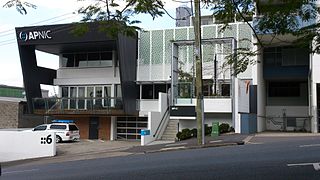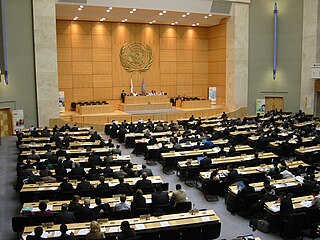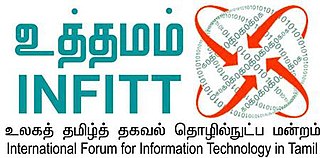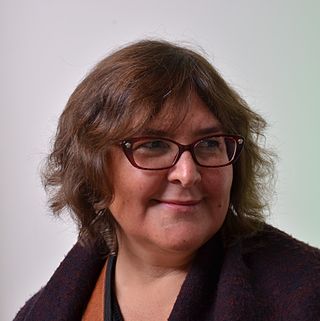
APNIC is the regional Internet address registry (RIR) for the Asia–Pacific region. It is one of the world's five RIRs and is part of the Number Resource Organization (NRO).

The World Summit on the Information Society (WSIS) was a two-phase United Nations-sponsored summit on information, communication and, in broad terms, the information society that took place in 2003 in Geneva and in 2005 in Tunis. WSIS Forums have taken place periodically since then. One of the Summit's chief aims is to bridge the global digital divide separating rich countries from poor countries by increasing internet accessibility in the developing world. The conferences established 17 May as World Information Society Day.
The Association for Progressive Communications (APC) is an international network of organizations that was founded in 1990 to provide communication infrastructure, including Internet-based applications, to groups and individuals who work for peace, human rights, protection of the environment, and sustainability. Pioneering the use of ICTs for civil society, especially in developing countries, APC were often the first providers of Internet in their member countries.

The United Nations Information and Communication Technologies Task Force was a multi-stakeholder initiative associated with the United Nations which is "intended to lend a truly global dimension to the multitude of efforts to bridge the global digital divide, foster digital opportunity and thus firmly put ICT at the service of development for all".

Community informatics (CI) is an interdisciplinary field that is concerned with using information and communication technology (ICT) to empower members of communities and support their social, cultural, and economic development. Community informatics may contribute to enhancing democracy, supporting the development of social capital, and building well connected communities; moreover, it is probable that such similar actions may let people experience new positive social change. In community informatics, there are several considerations which are the social context, shared values, distinct processes that are taken by members in a community, and social and technical systems. It is formally located as an academic discipline within a variety of academic faculties including information science, information systems, computer science, planning, development studies, and library science among others and draws on insights on community development from a range of backgrounds and disciplines. It is an interdisciplinary approach interested in using ICTs for different forms of community action, as distinct from pure academic study about ICT effects.
The Pacific Islands Chapter of the Internet Society (PICISOC) serves the Internet Society’s purposes by serving the interests of the global Internet community through its presence in the Pacific Islands. In addition to ISOC interests, PICISOC also focuses on local issues and developments and acts as an impartial advisor to governments and the public on matters of significant interest to Pacific Island people concerning the Internet and ICT technology in general.
Technology governance means the governance, i.e., the steering between the different sectors—state, business, and NGOs—of the development of technology. It is the idea of governance within technology and its use, as well as the practices behind them. The concept is based on the notion of innovation and of techno-economic paradigm shifts according to the theories by scholars such as Joseph A. Schumpeter, Christopher Freeman, and Carlota Perez.
The International Federation for Information Processing (IFIP) is a global organisation for researchers and professionals working in the field of computing to conduct research, develop standards and promote information sharing.

Tarek Kamel was an Egyptian politician and computer engineer expert in global Internet governance issues.

The Internet Governance Forum (IGF) is a multistakeholder governance group for policy dialogue on issues of Internet governance. It brings together all stakeholders in the Internet governance debate, whether they represent governments, the private sector or civil society, including the technical and academic community, on an equal basis and through an open and inclusive process. The establishment of the IGF was formally announced by the United Nations Secretary-General in July 2006. It was first convened in October–November 2006 and has held an annual meeting since then.
The African Telecommunications Union (ATU) is an organization in Africa that combines countries and mobile telecommunications providers in an attempt to dramatically increase development of the continent's information and communication technology (ICT) infrastructure.
International Conference on Computer and Information Technology or ICCIT is a series of computer science and information technology based conferences that is hosted in Bangladesh since 1997 by a different university each year. ICCIT provides a forum for researchers, scientists, and professionals from both academia and industry to exchange up-to-date knowledge and experience in different fields of computer science/engineering and information and communication technology (ICT). This is a regularly held ICT based major annual conference in Bangladesh now in its 25th year. ICCIT series has succeeded in engaging the most number of universities in Bangladesh from both public and private sectors. Each new university in Bangladesh have been investing in computer science, computer engineering, information systems, and related fields.
People First Network, also known as PFNet or Pipol Fastaem, started in Solomon Islands as part of UNDP's Solomon Islands Development Administration Planning programme (SIDAPP) and was developed by technical advisor David Leeming, Randall Biliki and others from January 2001. People First Network was initially a series of email stations around the Solomon Islands. The network provides email and other services to very remote rural areas. In particular the project was started as a means to link people to peacemakers following the ethnic tension and civil unrest in 2000, by providing rural communications and participatory news and information service.
Robert S. H. Istepanian is a visiting professor at the Faculty of Medicine, Institute of Global Health Innovation, Imperial College, London. Istepanian is widely recognized as the first scientist to coin the phrase m-Health. In 2012, Istepanian coined the new term 4G Health which is defined as "The evolution of m-health towards targeted personalized medical systems with adaptable functionalities and compatibility with the future 4G networks."
Design for All in the context of information and communications technology (ICT) is the conscious and systematic effort to proactively apply principles, methods and tools to promote universal design in computer-related technologies, including Internet-based technologies, thus avoiding the need for a posteriori adaptations, or specialised design.

The International Forum for Information Technology in Tamil is a non-profit, non-governmental nodal organization for collaboration among professionals, enthusiasts, government entities, and other international organizations working in the development and standardization of information technology for Tamil language. It has active liaison and collaboration with government entities in India, Sri Lanka, Singapore and Malaysia, and industry bodies like Unicode Consortium.
Positive Hack Days (PHDays) is an annual international cybersecurity forum. It has been held by Positive Technologies since 2011. PHDays brings together IT and infosec experts, government officials, business representatives, students, and schoolchildren. The forum hosts talks and workshops on the most interesting information security topics, The Standoff cyberexercises, practical competitions in which participants analyze the security of industrial control systems, banking and mobile services, and web apps.

Anriette Esterhuysen is a human rights defender and computer networking pioneer from South Africa. She has pioneered the use of Internet and Communications Technologies (ICTs) to promote social justice in South Africa and throughout the world, focusing on affordable Internet access. She was the executive director of the Association for Progressive Communications from 2000 until April 2017, when she became APC's Director of Policy and Strategy. In November 2019 United Nations Secretary-General António Guterres appointed Esterhuysen to chair the Internet Governance Forum’s Multistakeholder Advisory Group.
The African Internet Governance Forum (AfIGF) is a multistakeholder forum that facilitates dialogue on Internet governance issues. It is one of the 19 regional IGF initiatives and aims to address and discuss the issues of all 54 nations in Africa.







